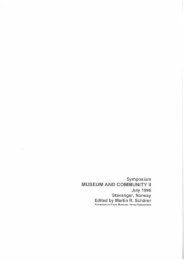Key Concepts of Museology - ICOM
Key Concepts of Museology - ICOM
Key Concepts of Museology - ICOM
Create successful ePaper yourself
Turn your PDF publications into a flip-book with our unique Google optimized e-Paper software.
which establishes a viewpoint on<br />
reality with regard to the world <strong>of</strong><br />
heritage (to consider something from<br />
the museal angle, for example, means<br />
to ask oneself whether it is possible<br />
to preserve it for exhibition to the<br />
public). <strong>Museology</strong> can thus be defi -<br />
ned as all the attempts to theorise<br />
or think critically about the museal<br />
fi eld, or as the ethics and philosophy<br />
<strong>of</strong> that which is museal.<br />
1. Museal identifi es a “specifi c<br />
relation to reality” (Stránský, 1987;<br />
Gregorová, 1980). This places it<br />
alongside politics and on the same<br />
level as social life, religion, demographics,<br />
economics and so on. Each<br />
example is a sphere or an original<br />
fi eld in which problems will be raised<br />
which will be answered by concepts.<br />
Thus the same phenomenon can<br />
be found at the point where several<br />
levels meet or, to speak in terms <strong>of</strong><br />
multidimensional statistical analysis,<br />
it will project itself onto several<br />
heterogeneous levels. For example,<br />
GMO (genetically modifi ed organisms)<br />
can be simultaneously a<br />
technical problem (biotechnology),<br />
a health problem (risks regarding<br />
the biosphere), a political problem<br />
(ecological issues), and also a museal<br />
problem: some social museums have<br />
decided to stage exhibitions on the<br />
risks and the issues <strong>of</strong> GMO.<br />
2. This position <strong>of</strong> museal as a<br />
theoretical fi eld <strong>of</strong> reference opens<br />
considerable avenues to expanded<br />
thinking, because the museum as<br />
institution now appears to be just one<br />
illustration or example <strong>of</strong> the entire<br />
fi eld. This has two consequences:<br />
(1) It was not museums that gave rise<br />
to museology, but rather museology<br />
that founded museums (the Copernican<br />
revolution); (2) This allows us to<br />
understand that experiences which<br />
are <strong>of</strong> a different nature to those<br />
usually identifi ed with museums<br />
(collections, building, institution)<br />
are part <strong>of</strong> the same problem, and<br />
to accept museums <strong>of</strong> substitutes,<br />
museums without collections, extramural<br />
museums, towns as museums<br />
(Quatremère de Quincy, 1796),<br />
and ecomuseums or even cyber<br />
museums.<br />
3. The specifi city <strong>of</strong> the museal<br />
fi eld, in other words, that which<br />
makes it unequivocal compared<br />
to neighbouring fi elds, lies in two<br />
aspects: (1) sensory display, which sets<br />
the museal apart from the textual,<br />
managed in a library, which <strong>of</strong>fers<br />
a documentation relayed through<br />
the medium <strong>of</strong> writing (mainly that<br />
which is printed; books) and which<br />
requires not only the knowledge <strong>of</strong><br />
a language but also the ability to<br />
read. This procures an experience<br />
which is more abstract and more<br />
theoretical at the same time. On the<br />
other hand, a museum does not need<br />
any <strong>of</strong> these aptitudes, because the<br />
documentation it proposes is above<br />
all sensory, perceivable by sight and<br />
sometimes by hearing, more rarely by<br />
the three other senses <strong>of</strong> touch, taste<br />
and smell. This means that an illiterate<br />
person or even a young child<br />
can always gain something from a<br />
museum visit, whereas they would<br />
49
















